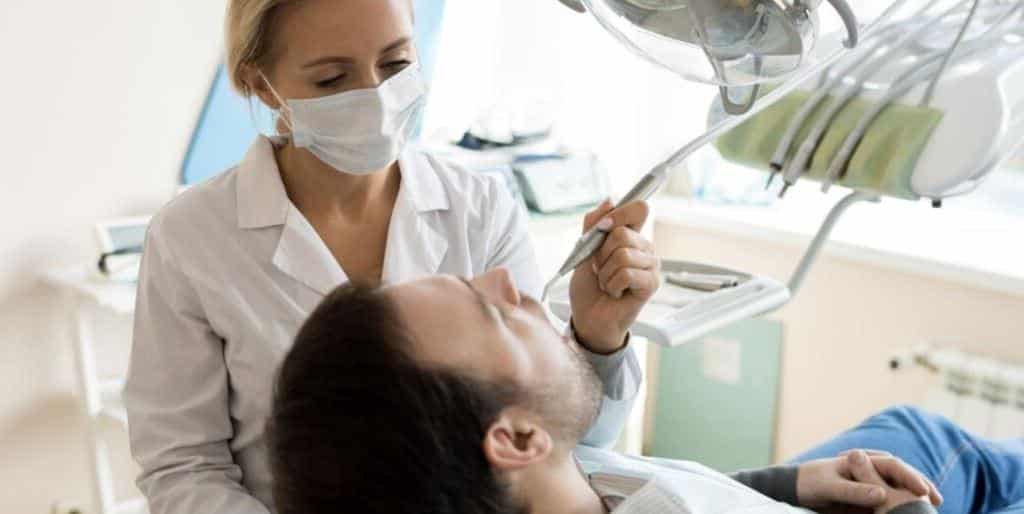Unfortunately, there is still a large proportion of the population that ignores all the warning signals given by the teeth. As a result, patients turn up at the dentist far too late with serious ailments. One of these is pus in the gums, which is the result of not treating and ignoring inflammation.
Pus in the gums - what exactly is it?
Abscess in the gum is an ailment that is caused by inflammation in the gum. An abscess (as this is the name of the pus-filled lesion that has formed on the gum) is a signal that you need to visit the dentist immediately. It is not possible to deal with an abscess by home means. The intervention of a specialist will be necessary. Why? There are many types of abscess and each will require different treatment.

How does an abscess form?
However, let us start at the beginning. As we mentioned, an abscess is the result of inflammation. We wrote more about this in our article "Gingivitis - symptoms and treatment". In short, inflammation can be caused by: decaying bacterial cells and tissues. What leads to this? One of the more common causes is caries. Abscesses are also caused by physical trauma, which leads to infection.
It is not uncommon for pus to collect on the gums as a result of root canal treatment. It will be recalled that root canal treatment just involves removing the infected pulp of the tooth (you can read more about this here: "Root canal treatment in the UK doesn't have to cost a fortune"). Sometimes the dentist fails to remove it completely, so that the bacteria present pass on to other tissues.
Pus in the gum also appears when an eighth tooth is erupting. The reason? The tooth may be in the wrong place or growing at the wrong angle. This can also lead to inflammation due to physical damage.
There are three types of abscess:
- Periapical is the first stage. You can recognise it by a severe toothache. Not infrequently it will also be accompanied by headache and jaw pain. The site of the abscess will be particularly sensitive to thermal stimuli.
- The second stage is the subperiosteal abscess. What characterises it? Pain will also radiate to other teeth, fever and chills may occur. If you decide not to visit the dentist now, you are facing the third stage, the submucosal abscess.
- Here you will be accompanied by swelling of almost the entire gum. A pimple will also appear, from which a discharge will slowly ooze. This may make you feel temporary relief, but it will not last long.
It is extremely important not to neglect the inflammation. If you delay visiting the dentist for too long, surgical intervention may be necessary!

Pus in the gums - how to get rid of it?
As we mentioned - home remedies are of no use. If you are in pain, you can help yourself with cold compresses before it is time for your visit to the dentist. The intervention of a specialist is necessary, there is no other way to get rid of an abscess.
What is the procedure for removing pus in the gums? When the abscess is still in the first, or periapical, stage, the lesion is treated with a root canal. A slightly more complicated procedure awaits the second stage. Here, it will be necessary to remove the root apex (resection) and replace it with a special material.
If you visit the dentist with a stage three abscess, it is likely that the tooth will need to be extracted.
As you can see, it is not worth delaying a visit to the dentist, as procrastination can have serious consequences. The best solution is regular - at least every 6 months - visits. Firstly, you can have a hygiene treatment (why it is so important you will read HERE). Secondly, your dentist can check the condition of your mouth and start any treatment at an early stage. Thus, you save time, nerves and money.
We would also like to remind you that at our practice we allow patients to receive treatment by instalments. The first twelve months are interest-free. This means that you will pay back exactly what you borrowed. So you don't have to delay your treatment any longer! Read our article: "Teeth on credit: dental treatment on hire purchase". We also encourage you to contact.
Remember. Our instalment scheme is 100% secure and regulated by the Financial Conduct Authority (FCA number 619628).

